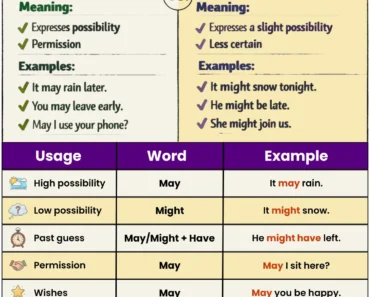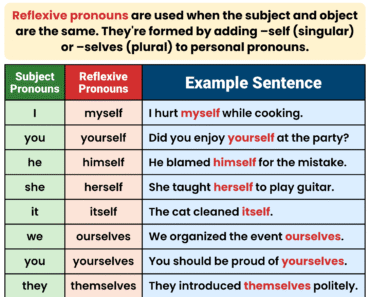
The simple future tense is used to describe actions or events that will happen after the present moment. It is commonly used for predictions, promises, decisions made at the moment of speaking, and plans for the future. The most frequent way to form this tense is with will or shall, while going to is often used to express intentions or plans.
In this lesson, you’ll learn how to form and use the simple future tense in affirmative, negative, and question forms, understand its structure, grammar rules and usage, recognize the difference between will and going to, and explore common time expressions—with clear examples.
When to Use the Simple Future Tense
The simple future tense is used to describe actions, events, or decisions that will happen after the present moment. It helps you talk about predictions, intentions, promises, offers, and plans. This tense often uses will or going to, depending on the meaning and context. Below are the most common uses with examples:
1. Predictions About the Future
Use the simple future tense to make predictions about what you think will happen. These are often based on opinions or guesses.
Examples:
- I think it will rain tomorrow.
- She will become a great artist one day.
- They will probably arrive late.
2. Promises and Offers
Will is used to make promises, commitments, or offers. Use it when you want to assure someone or agree to help.
Examples:
- I promise I will always support you.
- Don’t worry, I’ll pick you up at the airport.
- I’ll help you carry those bags.
3. Decisions Made at the Moment of Speaking
Use will for decisions you make right now, without planning ahead. This is called a spontaneous decision.
Examples:
- I’m thirsty. I think I’ll make some tea.
- Someone’s at the door. I’ll answer it.
- I forgot to call her! I’ll do it now.
4. Plans and Intentions
Going to expresses plans or intentions you made before speaking. It shows you already decided and are preparing to do something.
Examples:
- I’m going to start exercising regularly.
- She’s going to travel to Spain next summer.
- We’re going to buy a new sofa.
5. Predictions Based on Present Evidence
Use going to when you predict the future based on what you can see or know now. These predictions have clear evidence.
Examples:
- Look at those clouds. It’s going to rain soon.
- Be careful! That glass is going to fall.
- She’s coughing a lot. She’s going to be sick.
Simple Future Tense Structure
The simple future tense is formed by combining the auxiliary verb will with the base form of the main verb. This tense is used to talk about actions, events, decisions, and predictions that will happen after the present moment. In the simple future tense, “will” is used with the base form of the verb for all subjects.
Below, you’ll learn how to form the simple future tense in affirmative, negative, and question forms, and understand its structure and usage with clear examples.
Affirmative Form
Used to state that an action or event will happen in the future.
Structure: Subject + will + base verb
Examples:
- I will finish the report tomorrow.
- She will travel to Spain next month.
- They will call you later today.
Negative Form
Used to say that something will not happen in the future.
Structure: Subject + will not (won’t) + base verb
Examples:
- He will not join the meeting.
- I won’t forget to send the email.
- We won’t be late.
Question Form
Used to ask whether something will happen.
Structure: Will + subject + base verb?
Examples:
- Will you attend the conference?
- Will she come with us?
- Will they finish the project on time?
Short Answers
Used to reply clearly to yes/no questions about the future.
Examples:
- Will you call? ➔ Yes, I will. / No, I won’t.
- Will she cook? ➔ Yes, she will. / No, she won’t.
- Will they travel? ➔ Yes, they will. / No, they won’t.
Summary Table: Simple Future Tense
| Type | Structure | Example |
|---|---|---|
| Affirmative | Subject + will + base verb | She will call you soon. |
| Negative | Subject + won’t + base verb | I won’t forget the appointment. |
| Question | Will + subject + base verb? | Will they join the meeting? |
| Short Answer | Yes/No + subject + will/won’t | Yes, we will. / No, we won’t. |
Will vs. Going To in the Simple Future Tense
Both will and going to are used to talk about future actions, but they have different meanings and are used in different situations. Understanding how to choose the correct form helps you communicate your plans, decisions, and predictions clearly.
Will – Simple Future Tense
Will is often used for decisions made at the moment of speaking. It is also common for promises you make, offers to help, and predictions or opinions about the future when you don’t have present evidence.
Examples:
- I’ll call you tonight. (decision)
- I will help you with the project. (offer)
- I think it will rain tomorrow. (prediction)
Going To – Simple Future Tense
Going to is used to talk about plans and intentions that you decided before speaking. It also shows predictions when you can see evidence or have a reason to believe something will happen soon.
Examples:
- I’m going to visit my grandparents next weekend. (plan)
- Look at those clouds. It’s going to rain. (evidence)
Time Expressions with the Simple Future Tense
Here are the most common time expressions used with the simple future tense. These words and phrases help indicate when an action will happen. They make your sentences clearer and show exactly which future moment you are referring to:
| Time Expression | Example Sentence |
|---|---|
| tomorrow | I will call you tomorrow. |
| next week | She will start her new job next week. |
| in an hour | We will leave in an hour. |
| soon | The package will arrive soon. |
| later | They will visit us later. |
| shortly | The meeting will begin shortly. |
| by | I will finish the report by tomorrow. |
| this weekend | They will go camping this weekend. |
| in the future | People will travel to Mars in the future. |
| the day after tomorrow | He will return the day after tomorrow. |
| as soon as possible | I will complete the task as soon as possible. |






